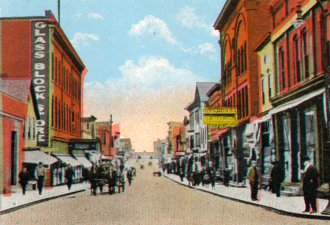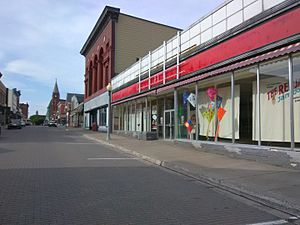Calumet Downtown Historic District facts for kids
|
Calumet Downtown Historic District
|
|
|
U.S. National Historic Landmark District
Contributing Property |
|

5th Street in Calumet c. 1910
|
|
| Location | 5th and 6th Sts. between Scott and Pine Sts., Calumet, Michigan |
|---|---|
| Architect | C. K. Shand |
| Part of | Calumet Historic District (ID89001097) |
| NRHP reference No. | 74000986 |
Quick facts for kids Significant dates |
|
| Added to NRHP | June 25, 1974 |
| Designated NHLDCP | March 28, 1989 |
The Calumet Downtown Historic District is a special area in Calumet, Michigan. It includes parts of 5th Street and 6th Street. This district is also known as the Red Jacket Downtown Historic District. That's because "Red Jacket" was the first name of the village.
This historic area is part of the larger Calumet Historic District. It is also inside the Keweenaw National Historical Park. The district was recognized as a Michigan State Historic Site in 1973. It was added to the National Register of Historic Places in 1974.
Discovering Calumet's Past: A History of Copper
The village of Calumet began in 1864. It was first called "Red Jacket." The village became an official town in 1867. Calumet grew because of the Calumet and Hecla Mining Company. This company mined a lot of copper nearby.
From 1868 to 1886, this company was the top copper producer in the United States. For several years, from 1869 to 1876, it was even the world's leading copper producer!
The success of the mining company helped Calumet grow. Most of the buildings in downtown Calumet were built between 1880 and 1910. This was when copper mining was at its busiest. At first, buildings were made of wood. Later, more solid buildings of sandstone and brick were constructed. This shows how much the town was growing and becoming richer.
Exploring the Calumet Downtown Historic District
The Calumet Downtown Historic District has 62 buildings. These buildings are along Fifth and Sixth Streets. They make up the main shopping and business area of Calumet.
The buildings are made from different materials. Some have wood or shingle exteriors. Others are covered with metal. Many are made of sandstone or brick. Some even mix sandstone and brick. These buildings create the unique look of the downtown streets. Some of them have very impressive fronts.
Many buildings have special decorations. These decorations were often bought ready-made by the builders. They include things like terra cotta trim, metal designs along the roof (cornices), small towers (turrets), and cast iron details.
A big copper strike happened in 1913. This caused money problems in the area for many years. Because of this, some buildings had their fronts changed. But often, these changes were put over the original materials. This means the old look can usually be brought back.
Two large buildings help define the district. St. Anne's Roman Catholic Church is at the south end. The Calumet Opera House is at the north end. The Calumet Fire Station is also in the district. It is now a museum about firefighters.
One of the newest buildings is the Woolworth's building from 1948. The F.W. Woolworth company operated there until the 1980s. This building looks different from the older ones around it. But it is an important part of American retail history.
Images for kids
 | Shirley Ann Jackson |
 | Garett Morgan |
 | J. Ernest Wilkins Jr. |
 | Elijah McCoy |











